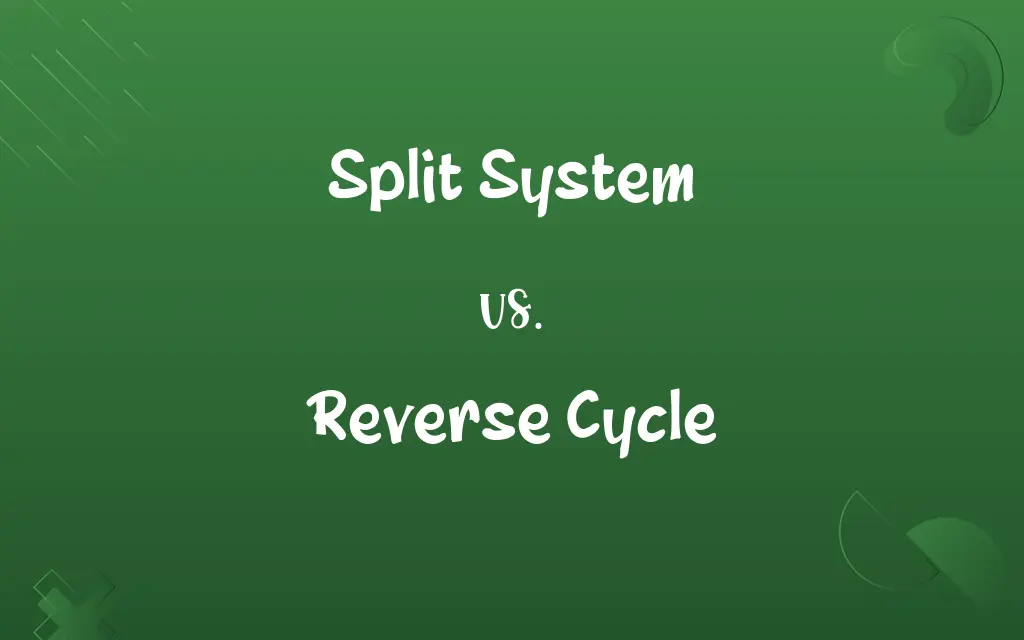Split System vs. Reverse Cycle: Know the Difference

By Shumaila Saeed & Dua Fatima || Published on October 4, 2024
A Split System provides heating or cooling through separate components, while a Reverse Cycle offers both heating and cooling in one unit, efficiently managing temperatures year-round.

Key Differences
A Split System air conditioner consists of two main parts: an outdoor unit and an indoor unit, connected by pipes, primarily designed for cooling. In contrast, a Reverse Cycle system can both heat and cool a space using a single unit, making it versatile for all seasons.
Shumaila Saeed
Oct 04, 2024
Split Systems are known for their efficiency in cooling and are often used in specific areas of a home or building. Meanwhile, Reverse Cycle systems use a heat pump technology to reverse the cooling process, providing warm air during colder months.
Shumaila Saeed
Oct 04, 2024
Installation of a Split System can be less complex since it does not require a ductwork system, making it a cost-effective solution for single-room applications. However, Reverse Cycle systems, while potentially more expensive upfront, offer a comprehensive climate control solution, making them cost-effective in the long term.
Shumaila Saeed
Oct 04, 2024
The energy efficiency of Split Systems is generally high when used for their primary purpose—cooling. Reverse Cycle systems, however, are highly efficient for both heating and cooling, often achieving higher energy ratings due to their heat pump technology.
Dua Fatima
Oct 04, 2024
Maintenance needs for both systems can vary; Split Systems might require less frequent maintenance due to their simpler operation mode. However, Reverse Cycle systems, with their dual functionality, might need more regular checks to ensure efficiency in both heating and cooling modes.
Shumaila Saeed
Oct 04, 2024
ADVERTISEMENT
Comparison Chart
Functionality
Primarily for cooling, though heating models are available.
Provides both heating and cooling efficiently.
Shumaila Saeed
Oct 04, 2024
Components
Comprises an indoor and an outdoor unit.
Single unit that can reverse the cooling process to heat.
Shumaila Saeed
Oct 04, 2024
Installation Complexity
Generally simpler, no ductwork required.
May require more extensive installation, especially if ductwork is needed.
Shumaila Saeed
Oct 04, 2024
Energy Efficiency
High for cooling; heating models may vary.
Highly efficient for both heating and cooling due to heat pump technology.
Shumaila Saeed
Oct 04, 2024
Cost Effectiveness
More cost-effective for cooling specific areas.
Cost-effective in the long term for comprehensive climate control.
Dua Fatima
Oct 04, 2024
ADVERTISEMENT
Split System and Reverse Cycle Definitions
Split System
Operates quietly due to the separation of components.
The split system in the bedroom is so quiet, it never disturbs our sleep.
Shumaila Saeed
Feb 29, 2024
Reverse Cycle
Utilizes heat pump technology for efficient temperature control.
Our energy bills lowered significantly after switching to a reverse cycle system.
Shumaila Saeed
Feb 29, 2024
Split System
A type of air conditioning system that divides the hot side from the cold side.
The split system's outdoor unit was installed on the balcony, efficiently cooling the apartment.
Dua Fatima
Feb 29, 2024
Reverse Cycle
Can be more cost-effective over time despite higher initial costs.
The reverse cycle system proved to be a smart investment, saving on energy costs.
Shumaila Saeed
Feb 29, 2024
Split System
Requires no ductwork, making installation easier.
Choosing a split system was ideal for our rental since it required minimal installation effort.
Dua Fatima
Feb 29, 2024
ADVERTISEMENT
Reverse Cycle
Requires regular maintenance to ensure efficiency in both modes.
We schedule maintenance for our reverse cycle system twice a year to keep it running smoothly.
Hifza Nasir
Feb 29, 2024
Split System
Commonly used for cooling single rooms or specific areas.
We installed a split system in the living room for targeted cooling.
Shumaila Saeed
Feb 29, 2024
Reverse Cycle
An air conditioning system that can both cool and heat a space using the same unit.
The reverse cycle unit kept us comfortable year-round, adjusting from cooling to heating as needed.
Dua Fatima
Feb 29, 2024
Split System
Offers models with heating capabilities, though less common.
Our split system also has a heating mode, which is perfect for chilly evenings.
Shumaila Saeed
Feb 29, 2024
Reverse Cycle
Ideal for climate control in homes and offices.
Installing a reverse cycle system in our open-plan office ensured a pleasant working environment.
Shumaila Saeed
Feb 29, 2024
Repeatedly Asked Queries
Can a Split System heat a room?
Yes, some Split Systems are designed with a heating function, though they are primarily known for cooling.
Shumaila Saeed
Oct 04, 2024
What is the main difference between a Split System and a Reverse Cycle?
A Split System primarily cools, while a Reverse Cycle provides both cooling and heating.
Dua Fatima
Oct 04, 2024
Is a Reverse Cycle system more energy-efficient than a Split System?
Reverse Cycle systems are highly efficient for both heating and cooling, often more so than Split Systems due to their heat pump technology.
Shumaila Saeed
Oct 04, 2024
Which system is better for a single room?
A Split System is often preferred for cooling a single room due to its simplicity and efficiency.
Hifza Nasir
Oct 04, 2024
Can a Reverse Cycle system save me money?
Yes, due to its efficiency in both heating and cooling, a Reverse Cycle system can be more cost-effective in the long run.
Dua Fatima
Oct 04, 2024
How do I know if a Reverse Cycle system is right for my home?
If you need both heating and cooling in one unit and are looking for an efficient, long-term solution, a Reverse Cycle system might be ideal.
Shumaila Saeed
Oct 04, 2024
Are Split Systems expensive to run?
Split Systems are generally cost-effective for cooling, though costs can vary depending on usage and model efficiency.
Shumaila Saeed
Oct 04, 2024
Can I install a Reverse Cycle system in an apartment?
Yes, Reverse Cycle systems can be installed in apartments, but it's important to consider the installation requirements and space.
Dua Fatima
Oct 04, 2024
Are there eco-friendly options for both types of systems?
Yes, there are eco-friendly models available for both Split and Reverse Cycle systems that use less energy and have a lower environmental impact.
Dua Fatima
Oct 04, 2024
Can a Reverse Cycle system work in very cold climates?
Yes, Reverse Cycle systems are effective in cold climates, but their efficiency can decrease in extremely low temperatures.
Shumaila Saeed
Oct 04, 2024
Is it worth upgrading from a Split System to a Reverse Cycle?
If you require both heating and cooling and wish for an efficient, all-year-round solution, upgrading can be beneficial.
Shumaila Saeed
Oct 04, 2024
Do I need ductwork for a Split System?
No, Split Systems do not require ductwork, making them easier and less expensive to install.
Shumaila Saeed
Oct 04, 2024
Is maintenance difficult for these systems?
Maintenance requirements can vary, but both systems generally require regular checks to ensure efficiency and longevity.
Hifza Nasir
Oct 04, 2024
How do I choose between a Split System and a Reverse Cycle?
Consider your specific needs for heating and cooling, space, budget, and long-term cost effectiveness to make the best choice.
Hifza Nasir
Oct 04, 2024
What's the lifespan of a Split System versus a Reverse Cycle?
Both systems can have similar lifespans, typically around 10-15 years, depending on maintenance and usage.
Shumaila Saeed
Oct 04, 2024
Share this page
Link for your blog / website
HTML
Link to share via messenger
About Author
Written by
Shumaila SaeedShumaila Saeed, an expert content creator with 6 years of experience, specializes in distilling complex topics into easily digestible comparisons, shining a light on the nuances that both inform and educate readers with clarity and accuracy.
Co-written by
Dua Fatima







































































